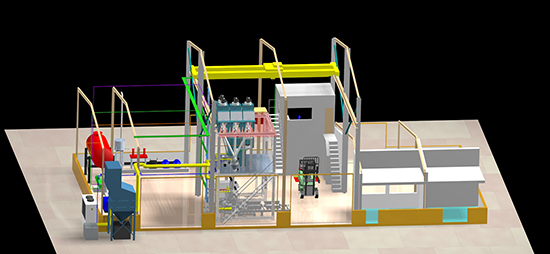MAYASA will build a mercury treatment plant which seeks to become a world referent
12 October 2017 | Madrid

Outline of the future mercury stabilization plant.
- The company is authorized by SEPI to invest three Million Euros in a “Mercury Stabilization Plant” at Almadén (Ciudad Real)
This project might turn MAYASA into a world referent at world level in the treatment for the stabilization of toxic and dangerous metals, since it will provide solutions based on a new technology developed by the company for managing these byproducts.
The Executive Committee of the Spanish state-owned industrial holding company Sociedad Estatal de Participaciones Industriales (SEPI) resolved to authorize to the company Minas de Almadén y Arrayanes, S.A., S.M.E. (MAYASA) to invest 2.95 M€ in the setup of a “Mercury Stabilization Plant”. The goal of this plant is the treatment and storage of the above mentioned metal, whose export was prohibited by the European Commission from 2011 onwards.
A new business line
It is envisaged that this project will be operating at the end of next year, with capacity for handling 317 Tons per year; it constitutes for MAYASA a new business line, which might turn it into a world-level referent for the stabilization of toxic and dangerous metals, thus guaranteeing a sustainable economic activity in an especially depressed area.
Within the framework of the European strategy for mercury, which seeks to restrict more and more the use of this metal in order to protect Human health and the Environment, this project is born as a result of the stabilization and encapsulation technology developed by MAYASA at laboratory-level within the MERSADE project. This project was began in collaboration with CIEMAT-CSIC and the Universidad de Castilla-La Mancha, as a result of the Common European regulation on mercury passed in 2008.
Innovation with competitive advantages
This technology, developed on the basis of the wide experience and knowledge accumulated by MAYASA regarding mercury, features a number of significant competitive advantages over other technics under development in Europe, as it is the only one which solidifies the final product, having won the support and interest from companies and institutions, including the European Parliament itself. The European regulation forbids the temporal storage of liquid mercury from 2023 onwards.
Other advantages of this project versus those from the competitors are the high temporal mercury storage capability which is immediately available – for up to 2,300 Tons – and a comprehensive service, which includes all the processing stages, from transport, treatment, solidification, and final storage. Equally, the fact of obtaining a product, clean and which poses little danger, constitutes a great advantage.
With the prohibition of the use of mercury from next December by the chlor alkali industry, there are 5,700 Tons of this metal from the European facilities, of which 1,200 Tons are stored at Spanish plants, and which will have to be treated. Furthermore, there are other industries which generate mercury, which will have to be treated too. In Spain 54 Tons of this metal are generated every year.
This project will represent one of the most important tasks which will have to face in the short-and-medium term Mr. Isidro Javier Zapata Romero, who was appointed MAYASA’s Chairman on September 29th, replacing in the post to Mr. Fernando Murillo Marinas, who was at the head of this company since June 2012.
The Minas de Almadén y Arrayanes, S.A. (MAYASA) company, whose sole shareholder is SEPI, focus its activity in the promotion of industrial, touristic and cultural projects, as well as on the setup of initiatives aimed at developing research and new technologies projects related to mercury and to other potentially toxic metals. It is also in charge of the farming and stockbreeding activities carried out at its land estates, as well as of the recovery and upkeep of the Company’s historical heritage, and the environmental recovery of its surrounding area. Until the European Commission prohibited, beginning on March 15th, 2011 to export mercury, its main activity was the extraction and commercialization of this metal.



